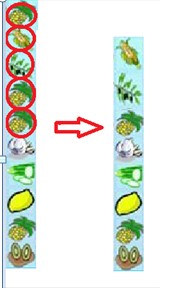LianLianKan
Time Limit : 2000/1000ms (Java/Other) Memory Limit : 32768/32768K (Java/Other)
Total Submission(s) : 1 Accepted Submission(s) : 1
Font: Times New Roman | Verdana | Georgia
Font Size: ← →
Problem Description
I like playing game with my friend, although sometimes looks pretty naive. Today I invent a new game called LianLianKan. The game is about playing on a number stack.
Now we have a number stack, and we should link and pop the same element pairs from top to bottom. Each time, you can just link the top element with one same-value element. After pop them from stack, all left elements will fall down. Although the game seems to be interesting, it's really naive indeed.

To prove I am a wisdom among my friend, I add an additional rule to the game: for each top element, it can just link with the same-value element whose distance is less than 6 with it.
Before the game, I want to check whether I have a solution to pop all elements in the stack.
Now we have a number stack, and we should link and pop the same element pairs from top to bottom. Each time, you can just link the top element with one same-value element. After pop them from stack, all left elements will fall down. Although the game seems to be interesting, it's really naive indeed.

To prove I am a wisdom among my friend, I add an additional rule to the game: for each top element, it can just link with the same-value element whose distance is less than 6 with it.
Before the game, I want to check whether I have a solution to pop all elements in the stack.
Input
There are multiple test cases.
The first line is an integer N indicating the number of elements in the stack initially. (1 <= N <= 1000)
The next line contains N integer ai indicating the elements from bottom to top. (0 <= ai <= 2,000,000,000)
The first line is an integer N indicating the number of elements in the stack initially. (1 <= N <= 1000)
The next line contains N integer ai indicating the elements from bottom to top. (0 <= ai <= 2,000,000,000)
Output
For each test case, output “1” if I can pop all elements; otherwise output “0”.
Sample Input
2 1 1 3 1 1 1 2 1000000 1
Sample Output
1 0 0
Source
2012 ACM/ICPC Asia Regional Changchun Online
